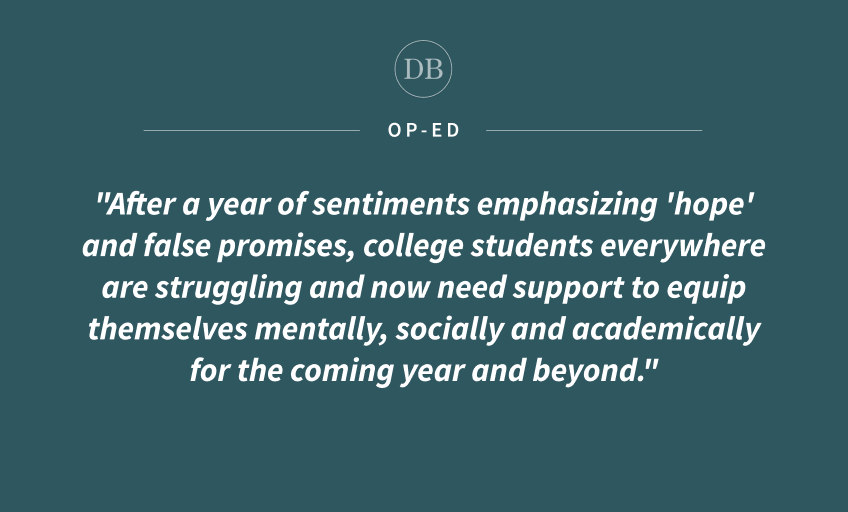Op-ed: Universities must help students mitigate harmful impacts of online learning

By Anna Spain
April 13, 2021 4:05 p.m.
A year after our national response to the COVID-19 pandemic pushed us into a nearly complete virtual existence, our leaders – including those in our educational institutions – must now help students mitigate the inevitable, harmful ramifications of digital life those same leaders have warned of for years.
The immediate consequences of COVID-19 are devastating, but I fear they are just the tip of the iceberg. Underneath lies a rising mental health toll, impacting people of all demographics, especially students, that will persist post-pandemic. As a third-year student, I am now facing those repercussions.
Warnings that excessive time online can contribute to a slew of mental health consequences have been at the forefront of health education for more than a decade. Extensive research has revealed that increased screen time significantly reduces attention span, ability to focus, sleep quality and time for positive activities. These consequences have been linked to more troubling long-term effects, including depression, social isolation, poor stress regulation and habits echoing drug addiction. Now, the lines between academic, professional and personal life have become nearly indistinguishable, and digital time management is no longer a choice.
Virtual existence is increasingly overwhelming and exhausting – just as we have been warned.
Despite the general consensus that students are struggling to stay motivated online, many still feel considerable pressure to maintain their academic performance. Although I would prefer to reduce screen time and engage in activities that benefit my mental well-being, pulling myself away from assignments often feels like a waste of time. With a seemingly endless workload, many students feel the need to accomplish tasks as quickly as possible, for example – watching previously recorded lectures at twice the normal speed.
Conversely, other students battle paralyzing procrastination. Coursework accumulates without the sense of urgency that used to accompany trekking through campus to secure a seat in lecture halls. Most days, school simply does not feel real. I regularly experience these challenges as I oscillate between desperation for control and utter hopelessness at the COVID-19-induced uncertainty.
While many people have experienced a loss of identity due to the pandemic, college students are stranded somewhere between the high school versions of ourselves that we left at home and the people we are becoming independently. In addition to academics, college is meant to be an immersive experience that helps develop life, social and practical skills. Without that experience, many of us are left questioning ourselves and our futures as what we anticipated to be the so-called “best years of our lives” slip away. The future seems more daunting than ever as our aspirations and dreams are darkened by uncertainty and confusion.
So, now that an entire year has passed since universities closed, what has changed? Initially, professors reshaped their expectations. But as the pandemic persists, academic expectations have mostly returned to “normal.” This exacerbates the inconsistencies students face in their daily lives such as differences in time zones, access to resources and conducive study environments. Further, students across the nation now have vastly different in-person opportunities to develop hands-on skills, gain firsthand exposure to career fields and connect with professors to further their education and qualify for graduate programs, which broadens inequity at a regional and postgraduate level.
With the end of the pandemic nearing closer, schools need to dedicate more resources to increase and facilitate in-person and remote mental health services. This will help reconnect students and reestablish support systems that have been lost. Universities should also heavily publicize existing resources from student-led organizations to promote peer support. This is critical to expand accessibility for students’ mental health care, begin to remediate the mental health consequences that may have started or intensified over the course of the pandemic and alleviate challenges that are bound to emerge once life returns to its previous pace.
The uncertainty of what is to come intensifies the anxiety students have been experiencing. Universities must be transparent with their students and keep them up to date with the most current information from county public health departments. Although many students are eager to return to campus, this is bound to be just as challenging and confusing as the move to virtual was. Universities need to clearly communicate considerations for their students to safely return to campus as early and as often as possible. This includes vaccine distribution updates, a concrete plan for the transition to in-person instruction and timely updates as public health guidelines frequently change and inevitably impact the plan for return.
After a year of sentiments emphasizing “hope” and false promises, college students everywhere are struggling and now need support to equip themselves mentally, socially and academically for the coming year and beyond. University administrations must act now and help students prepare for the negative impacts of excessive online time they have taught us to expect.
Spain is a third-year psychobiology student.


